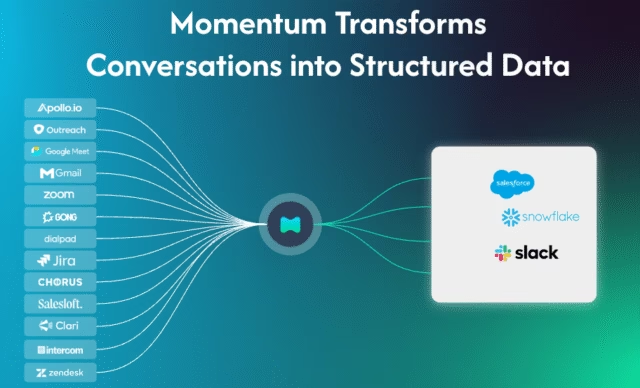Sales today is less about how many calls you make and more about how well you understand the numbers behind those calls. The problem is that sales teams often sit on mountains of data without a clear way to use it. Reports pile up, CRMs overflow, and reps still wonder what to do next.
In this blog, we will talk about how AI sales software cuts through the clutter, turns data into useful insights, and helps teams sharpen their selling approach.
From Data Overload to Data Clarity
Every sales team has access to data, too much of it, in fact. From call notes and emails to pipeline stages and customer interactions, information comes in from every direction. Yet all that data doesn’t mean much if you can’t make sense of it.
AI sales software helps teams cut through the noise by organizing information into insights that guide better actions. Instead of digging through endless reports or relying on gut instinct, you can spot patterns that show where deals stand and what steps actually move them forward. The shift is simple but powerful: data becomes a tool you can use in the moment instead of a record you only revisit later.
Turning Insights into Actionable Steps
Having clean dashboards or detailed reports is one thing, but what you really need are the next steps. That’s where AI makes a difference. Instead of handing you numbers to interpret, it suggests what to do with them.
For example, AI might flag a lead that matches the profile of past wins or highlight the best time to reach out. It can point out which accounts are slowing down and suggest strategies to re-engage them. This saves you from wasting hours chasing prospects who were never likely to convert. The result? You spend more time on high-value opportunities while cutting down on guesswork.
Better Forecasting for Sales Leaders
Forecasting has always been the backbone of sales planning, but human estimates often fall short. Too much optimism or outdated assumptions can leave leaders scrambling to hit targets. AI changes this by analyzing past deals, seasonality, and buyer behavior to spot trends you might miss.
When forecasts are accurate, you can make smarter decisions about hiring, quotas, and investments. You don’t just predict revenue; you plan with confidence. This gives leaders a more reliable picture of the road ahead and helps teams stay aligned around realistic expectations.
Personalization at Scale
Buyers today expect messages that feel relevant to them. Sending the same pitch to everyone no longer works, but personalizing every email manually is nearly impossible. AI bridges that gap by reading buyer signals and tailoring outreach without requiring hours of manual work.
For instance, it can look at how a prospect interacts with your content, track engagement across channels, and suggest the right approach. You might learn that one contact responds better to case studies while another engages with product tips. Instead of guessing, you know what will likely spark interest. That level of personalization builds stronger connections, and you can deliver it at scale.
Supporting Smarter Team Decisions
Managers often face the challenge of knowing how their teams are performing in real time. Traditional reporting cycles mean problems surface only after they’ve grown. AI fixes this by offering dashboards that update instantly and highlight where reps might be stuck.
You can see which deals are stalling, which reps need coaching, and where prospects drop out of the funnel. This kind of visibility lets managers step in early instead of reacting too late. By making decisions based on live insights, leaders can support reps better and keep pipelines healthier.
Balancing Human Skill with AI Insights
It’s worth saying clearly that AI won’t replace the role of sales reps. Selling is still about building trust, understanding needs, and handling the unexpected, all of which require human skill. What AI does is act like a guide, pointing reps toward the right opportunities and giving them the context they need to succeed.
Think of it this way: AI can tell you the best time to call, but it can’t build a genuine relationship for you. The real value comes when reps use AI insights alongside their own judgment. When both work together, deals move faster, and relationships grow stronger.
Conclusion
Selling today is as much about decisions as it is about effort. You can make calls all day, but unless you know which ones matter, progress will be slow. AI sales software is the bridge between having data and using it well. It organizes the clutter, sharpens your focus, and makes sales less about guesswork and more about precision.
AI will likely become even more adaptive, updating suggestions in real time as buyer behavior changes. Teams that learn to work with these tools now will be ahead of the curve. The future of selling is about using it wisely, with the right mix of technology and human judgment.







